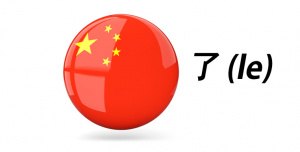Difference between revisions of "Language/Mandarin-chinese/Grammar/了-le"
| Line 21: | Line 21: | ||
Look at the two examples below: | Look at the two examples below: | ||
* <span class="notranslate">他學漢語。/他学汉语。 Tā xué hànyǔ.</span> | |||
<blockquote>He studies Chinese.</blockquote> | <blockquote>He studies Chinese.</blockquote> | ||
(There is no particular indication of time, whether it has been a long time since it started or not, it is a very simple sentence). | (There is no particular indication of time, whether it has been a long time since it started or not, it is a very simple sentence). | ||
* <span class="notranslate">他學漢語了。/他学汉语了。 Tā xué hànyǔ le.</span> | |||
<blockquote>He has just started to study Chinese.</blockquote> | <blockquote>He has just started to study Chinese.</blockquote> | ||
Revision as of 15:58, 17 November 2018
Hello everybody!
In today's lesson, we will teach you how to use the modal particle 了 (le) which is sometimes hard to understand for Chinese learners.
Feel free to edit this wiki page, if you think it can be improved.
Rules
了 (le) is a modal particle indicating that the situation is new.
It is placed at the end of the sentence.
The use of 了 is not always obvious for a beginner.
In many sentences, if you don't use 了, it is correct in grammar, but native speakers will feel that the sentence is still not finished.
On the other hand, it comes naturally enough with practice. It is therefore important to learn standard phrases by heart.
Examples
Look at the two examples below:
- 他學漢語。/他学汉语。 Tā xué hànyǔ.
He studies Chinese.
(There is no particular indication of time, whether it has been a long time since it started or not, it is a very simple sentence).
- 他學漢語了。/他学汉语了。 Tā xué hànyǔ le.
He has just started to study Chinese.
(The 了 (le) indicates that it is new, that he did not study Chinese before and that he put himself in it).
In the example above, we can easily make sense in English, but this is not always the case:
- 你多大? Nǐ duō dà?
How old are you?
- 你多大了? Nǐ duō dà le?
How old are you?
(in the sense of "Now, how old are you?")
- 現在幾點?/现在几点? Xiànzài jǐ diǎn?
What time is it right now?
- 現在幾點了?/现在几点了? Xiànzài jǐ diǎn le?
What time is it right now?
(reinforces the idea of "now", but in the sense of change).
Here are some more examples:
- 他去中國。/他去中国。 tā qù zhōng guó.
He's going to China.
(maybe he's getting ready or he's already at the airport)
- 他去中國。/他去中国了。 tā qù zhōng guó le.
He went to China.
(That's it, it's done, he's gone.)
- 我看見他。/我看见他。 Wǒ kànjiān tā.
I see him.
- 我看見他了!/我看见他了! Wǒ kànjiān tā le!
I see him (now)!
For a negation in a past context, do not add the 了:
- 他没去中國。/他没去中国。 Wǒ méi qù zhōngguó.
He did not go to China.
- 我没看見他。/我没看见他。 Wǒ méi kànjiàn tā.
I did not see him.
On the other hand, the expression 不 ..... 了。 Bù ...... le means "no longer":
- 他不学汉语了。 tā bù xué hàn yǔ le.
He does not study Chinese anymore.
Sources
http://www.chine-culture.com/chinois/cours-de-chinois-6-grammaire.php
